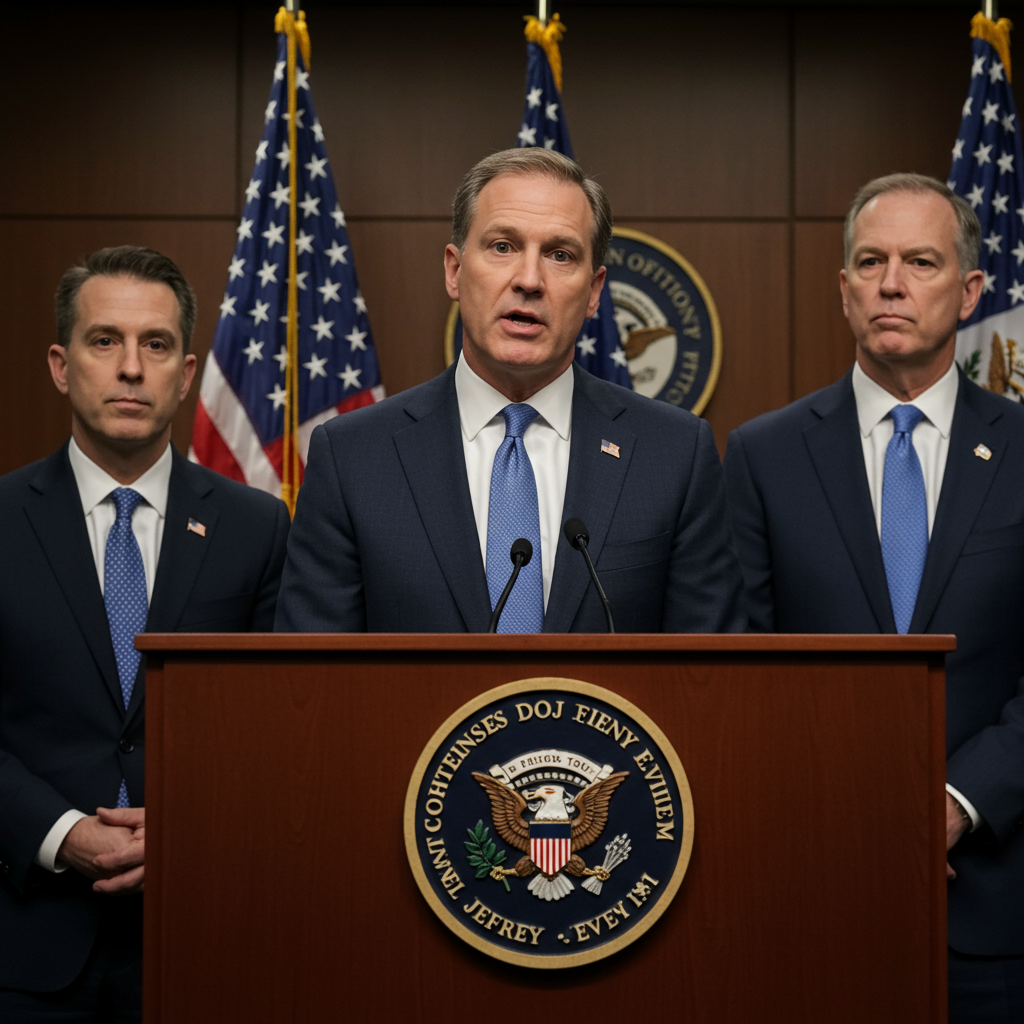A comprehensive review by the Justice Department (DOJ) and the FBI, initiated under President Donald Trump-appointed leadership, has concluded that there is no evidence notorious financier Jeffrey epstein maintained a “client list.” This purported list was widely speculated to contain associates linked to his sex trafficking operation, potentially for blackmail or conspiracy. The federal review also definitively confirmed that Epstein died by suicide in his Manhattan jail cell in 2019, directly contradicting numerous conspiracy theories that have persisted for years.
According to a detailed memo reviewed by ABC News and other outlets, investigators found no credible evidence supporting the existence of such an incriminating list or suggesting that Epstein blackmailed prominent individuals. The review explicitly states that investigators “did not uncover evidence that could predicate an investigation against uncharged third parties.” As a result, no further charges are expected in connection with the federal probes into Epstein’s criminal activities, beyond those already brought against his associates, including Ghislaine Maxwell.
The findings of this extensive review are likely to spark significant public debate, particularly among those who have long claimed a government cover-up to protect powerful figures and insisted upon the existence of a hidden client list. Multiple sources have told ABC News over time that no such list has ever surfaced in their investigations. The DOJ memo directly addresses the speculation, stating that one of the government’s “highest priorities is combatting child exploitation and bringing justice to victims,” adding pointedly, “Perpetuating unfounded theories about Epstein serves neither of those ends.”
Federal Review Examines Extensive Evidence
The DOJ and FBI review was a massive undertaking. It reportedly involved as many as a thousand FBI agents, many of whom were typically focused on national security matters, repurposed to pore over the vast trove of materials related to the Epstein case. The process included extensive digital searches of over 300 gigabytes of data across databases, hard drives, and network drives. Physical searches were also conducted in various locations where investigation materials were stored, including locked cabinets and desks.
A key component of the review was the examination of hours of purported footage related to Epstein’s time in custody. This included approximately 10 hours of jailhouse security footage. According to the memo, this video evidence further corroborates the official conclusion that Epstein died by suicide on August 10, 2019. Specifically, the footage confirms that no individual entered any of the tiers in Epstein’s housing unit from the time his cell was locked at 10:40 p.m. on August 9 until approximately 6:30 a.m. the following morning. Current FBI leadership, including Director Kash Patel, has publicly referenced the clarity of this video in interviews, stating it provides no evidence of foul play.
Political Context and Pressure for Disclosure
The findings come amidst considerable political pressure for the government to release more information regarding Epstein. Attorney General Pam Bondi had previously committed to making scores of federal records public. However, delays have occurred, which Bondi attributed in recent interviews to the presence of “tens of thousands” of videos within the FBI’s possession potentially depicting child pornography.
In a move that reportedly surprised White House officials and disappointed some supporters expecting major revelations, Bondi distributed binders labeled “The Epstein Files: Phase 1” to pro-Trump social media influencers at the White House in late February. These files reportedly contained little new information already in the public domain. Bondi has faced growing criticism from some Trump supporters over the perceived slow pace and limited scope of the document releases.
The White House and President Trump himself have been questioned about the timing of further file releases. In an exchange in April, Trump stated he was unaware of the specific timeline but would speak to the Attorney General about it.
Adding to the political backdrop, tech billionaire Elon Musk, in a now-deleted social media post, claimed that Donald Trump’s name was in the “Epstein files” and that this was the actual reason for the delay in their public disclosure. Trump dismissed Musk’s claim as “old news,” emphasizing in interviews that he had not been friendly with Epstein for roughly 18 years before his death. He stated the matter had been discussed for years and even Epstein’s lawyer had confirmed he had no involvement.
No Further Disclosure Planned
The DOJ memo confirms previous findings that Epstein harmed over one thousand victims, each enduring profound trauma. The materials reviewed contain deeply sensitive personal information about these victims, including names, physical descriptions, birthplaces, associates, and employment history.
Based on their comprehensive review, the DOJ and FBI have determined that no evidence was found to justify initiating an investigation into uncharged third parties in connection with the Epstein case. The memo reiterates the government’s commitment to combating child exploitation and bringing justice to victims. Citing the sensitivity of victim information, the inclusion of illegal child sex abuse material, and the lack of evidentiary support for key conspiracy theories, the department concluded that no further public disclosure beyond the findings detailed in the memo is deemed appropriate or warranted. They will not permit the release of child pornography.
The government’s stance is that further speculation and the perpetuation of unfounded theories detract from the crucial work of supporting victims and combating child exploitation. While this announcement aims to provide clarity, it is likely to fuel continued debate and skepticism among those who believe significant information is still being withheld.
Frequently Asked Questions
What did the DOJ/FBI review conclude about a “Jeffrey Epstein client list” and his death?
The extensive review by the Justice Department and the FBI concluded there is no evidence that Jeffrey Epstein maintained a “client list” of individuals involved in his crimes or for blackmail purposes. The review also confirmed that Epstein died by suicide in his Manhattan jail cell in 2019. These findings directly contradict widespread speculation and conspiracy theories.
What evidence or materials did the review examine to reach its conclusions?
The review was comprehensive, involving digital searches of over 300 gigabytes of data and physical searches of stored materials. A key part of the process was the examination of approximately 10 hours of jailhouse security footage, which officials say supports the suicide conclusion by showing no one entered Epstein’s housing unit tier during the critical overnight period before his death.
Why is the government not releasing more Epstein files, despite public pressure?
The DOJ memo states that further disclosure is not warranted because investigators found no evidence to support conspiracy theories or justify charges against uncharged third parties. Additionally, the materials contain extensive illegal child sex abuse material and deeply sensitive personal information about over 1,000 victims, and the government’s priority is protecting victims and combating child exploitation, which they argue is undermined by perpetuating unfounded theories.



